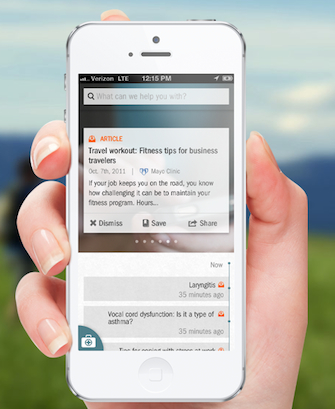 Health Hero co-founder and Rock Health mentor Geoffrey Clapp announced this week the launch of his new startup, Better, which is backed by The Mayo Clinic and The Social+Capital Fund, according to the demo he gave onstage at the Wall Street Journal's D:Mobile event in New York City. (Social+Capital has also funded Asthmapolis, Simplee, and Glooko.)
Health Hero co-founder and Rock Health mentor Geoffrey Clapp announced this week the launch of his new startup, Better, which is backed by The Mayo Clinic and The Social+Capital Fund, according to the demo he gave onstage at the Wall Street Journal's D:Mobile event in New York City. (Social+Capital has also funded Asthmapolis, Simplee, and Glooko.)
Clapp described Better as "the best way for you to get healthcare wherever you are directly on your mobile device." He also said that while there have been promising developments with healthcare legislation, new medical sensors, and big data, "there isn't a great mobile experience for healthcare yet" and that's what Better aims to bring.
The user experience of the Better app begins with "Siri for healthcare", Clapp said. The app asks: "What can we help you with?" (in writing) and the user types in their question or issue. Arguably, the core offering of the app is a symptom navigator, similar to iTriage. Better, however, is stocked with medical content from the Mayo Clinic. If a user enters certain symptoms, Better might suggest a user consider seeking emergency care or calling their physician, but for those users who have a paid subscription to Better, the app can connect them -- when appropriate -- with a lifestyle coach, registered nurse, or physician at the Mayo Clinic.
At the D:Life conference Clapp showed how a user with abdominal pains can use the symptom navigator to get to a potential cause of celiac disease and connect to a registered nurse at the Mayo Clinic via a phone call. The RN, named Linda, knew that Clapp had just used the symptom navigator and that it had suggested celiac as a potential cause. After a two-minute call she offered him a few tips for over the counter meds, emailed some home remedies, and set up an appointment for him at a lab by him near Stanford University.
When pushed, Clapp shared the general price points for the paid services that Better plans to offer. Users who sign up for a monthly plan that includes access to a lifestyle coach will pay about $150 a month. Access to a nurse scales up to about $400 a month, Clapp said, while real-time access to a doctor will end up running between $400 and $1,000. There's also a very high end option that includes flying out what Clapp called a "healthcare SEAL team" to wherever the user was to pick them up and fly them back to the Mayo Clinic. Clapp said this "black card" option will cost in the thousands of dollars per month.
Clapp told attendees at D:Live that the Better app and services are set to launch at the end of the summer and it seemed clear that prices were not yet finalized.
Besides the curated content, symptom navigator, and premium telephone consultation services, Better also integrates with various fitness tracking devices. While Clapp didn't specifically name which devices his app would pull data from, he was wearing both a Basis Band and (what appeared to be) a Jawbone UP on either wrist and did reference both of them during the demo. Basis might be providing heart rate data, while the other wrist-worn device was for tracking steps, he said.
Following his demo on-stage, Clapp wrote a post on his personal blog about Better's launch. An interesting passage was this explanation for why the business model is (initially, anyway) focused on direct-to-consumer:
"I believe empowering consumers to be engaged in their health starts with choice. Mobile and consumer choice has changed every market, and healthcare is not an exception to this force," Clapp wrote. "We will work to drive healthcare prices down and to expand options to as much of the population as we can. This starts by providing choice, and exceeding expectations of what “quality care” really means. At Better we’ve already taken services you simply can’t get today, made many of them free, and cut the cost of most of them by 30% or more. We will also offer more premium services at a higher price point, and if you want a jet to come pick you up in a foreign country and fly you back to the best care in the world (yes, we offer this), it costs money and is not for everyone. But the very engine of a market economy is empowering customers and growing a market is giving them the choice, and we're very sure this will have a net-positive effect on the market costs, overall."
The whole post is worth a read for more perspective on Better. There's also a video of Clapp's demo over WSJ here.

















